In honor of Veterans Day, our Senior Director of Student Services, Dami Tokoya recently sat down with a few of our veteran students to discuss the impact being in the military made on them, and how their time serving the Nation influenced them to practice integrative medicine here at AOMA.
Meet Caitlyn Kelly!
US Army, SPC, 2012-2017
1. What motivated you to join the military?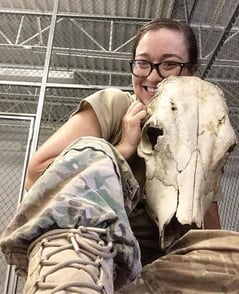
CK: I won't lie, I was working three jobs and still about to lose my house, so I joined the military. Plus, I really needed health insurance.
2. How does your military experience translate into being a student?
CK: It definitely puts a lot of the stresses of student life into perspective. My military experience enables me to compartmentalize efficiently and get my work done in a timely and effective manner. Also, since I worked as a linguist (Persian-Farsi, some Dari, and German) I learned to process vast quantities of information in a very limited time and recall them accurately as needed;.
3. What are your hobbies?
CK: I very much enjoy working out, I mix it up a lot between yoga, running, and lifting. I am experimenting with being a novelist, I love reading so it seems like the logical next step. I also do hobby taxidermy!
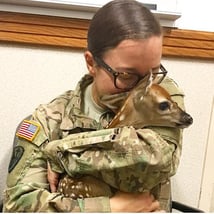
4. As a Veteran, can you describe the positive impact practicing integrative medicine, acupuncture, etc has had on you?
CK: I am very much enjoying the ability to continue to serve in the new capacity as a healer. It also gives me a chance to continue to support my brothers and sisters at arms after retiring from the military.
5. What are your plans for after graduation?
CK: I’m opening my own clinic down in Spring Branch, Tx.
Meet Monique Jones!
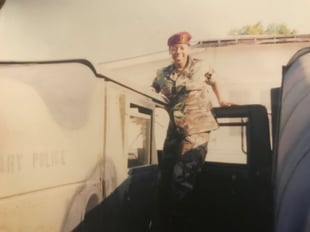
1. What motivated you to join the military?
MJ: I was living with my mom after I graduated high school, feeling like I was grown and had life all figured out. My mom had a problem with me coming home at all hours of the night. I of course with very little perspective on what adulting was believed I shouldn’t have a curfew because I was “grown”. One night I came home at around 3am. My mom was furious. She told me if I couldn’t respect her rules then I had to leave. I stormed off to my room to grab some things before I left. I really had no idea where I was going. I reckon my mother knew that. She stood in front of the door with her arms spread wide shouting at me repeatedly “where do you think you’re going”. I just looked at her with a dumb look and went back to my room. I didn’t go to sleep. I just sat there watching the screen not paying attention to what was on. Then the infamous song played “Be all that you can be, in the Army”. That night I didn’t sleep. In the morning instead of going to work as a salesclerk at Victoria Secret, I went to the local recruiting station. Just like that I was grown enough to make the impulsive decision without any approval. Still today it’s the best decision I’ve made in my life thus far. Oh, I did do a lot of growing up over the years. I must say the I’m blessed and honored to have worked in such a profession with amazing leaders, peers, and subordinates. All of them have contributed to my success and growth over the years. There are words I can express to thank them all enough. If my mom were alive, she would say the same. She was so proud of me.
2. How does your military experience translate into being a student?
MJ: Perseverance and grit! I don’t think there anyone in the world who would say the life of a service member is easy. At times it’s a thankless job with immeasurable task. Throughout the years it has been the greatest challenges that I didn’t think were humanly possible that made me a better person. Along with serving in the military, being a parent has also been instrumental in my development process. It’s such an honor to be a mom but being a service member and a mom presents great challenges. I’m not sure I would have made it without my kids. There are times I feel like they teach me more than I teach them. Their resilience and stand-up character should be emulated by all. Providing for them was and still is my number one mission. When service members across the world have a mission, no matter how demanding it maybe it has to be accomplished for the greater good. It takes a lot of faith, perseverance, and grit to be successful. What I’ve come to realize is discipline and dedication will get you through. You can’t just be a part of something or an idea because it sounds good or its popular. You must have conviction in what you’re doing, be dedicated, and disciplined in your execution. To be an Acupuncturist is no easy task. The curriculum is quite challenging and demanding. I want to be an Acupuncturist to serve the community. In order to serve the community best in the future I must be disciplined in my studies now. I must be willing to persevere through challenges and know that it’s all part of the process.
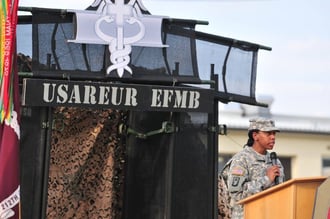 3.What are your hobbies?
3.What are your hobbies?
MJ: Finding a hobby is one of my post military goals. I want to learn to play violin and piano, mentor the youth and host socials for women. I don’t really have a hobby at the moment. If I had to choose, I would say I’m a professional learner. I love learning new things, speaking, teaching, traveling, and quality time with my kids and family.
4. As a Veteran, can you describe the positive impact practicing integrative medicine, acupuncture, etc has had on you?
MJ: The greatest impact has been what I’ve learned about my body and how it operates. Prior to learning what I’ve learned thus far I didn’t pay attention to how much the mind, body and spirit were connected to influence harmony for us as beings. Understanding symptoms in my body that I previously ignored, then being able to identify a food source that has healing properties to relieve the abnormality is simply amazing to me. The medicine is so amazing. I wouldn’t say everyone should fire their current healthcare plan and only use Traditional Chinese Medicine, but I do believe everyone should be educated on how it works.
5. What are your plans for after graduation?
MJ: The most important thing for me after graduation is to educate the community on how to observe and listen to their bodies as a prevention method for illness. It important to me that the community know that there are alternative methods for treating illnesses, pain and cognitive/emotional conditions that don’t require medications with side effects. I want to influence the community to take a more personal approach to their own healthcare. I want to specialize to treat pain and cognitive/emotional conditions. At the moment I’m projecting my target client population to be service members, veterans and children. At first thought I would like to have my own private practice though I’m aware of the various benefits of integrative medicine. 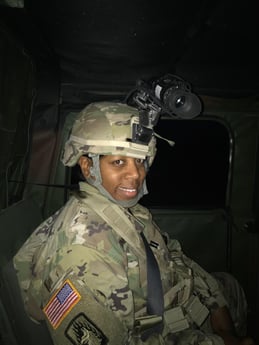
6. How do you feel both your military experience and your education have prepared you for your future?
Meet Robin Boyles!
US Army, 1SG, 1990-2010
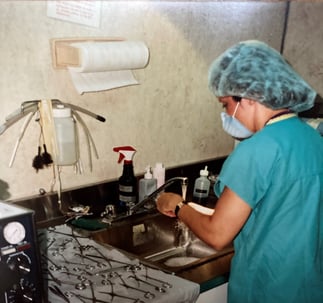
I am a 20-year Army veteran. I served in the Army Veterinary Corps from 1990 - 2010. My first assignment was overseas in Rota, Spain for three years. Dream job and place to live on the southern border bay of Cadiz. Loved it! I served mostly in Europe I spent a total of nine years in Germany, three years in Italy and one year in Iraq from 2004-2005. I joined the military because I wanted to see the world and it was a fantastic experience! I worked in the veterinary clinic seeing animals every day, x-rays, surgery, vaccines, you name it. Our main job was keeping military working dogs healthy and educating their handlers on how to care for them. It was a great job and I learned a lot.
My greatest take away was meeting and working with people from everywhere. I love experiencing new cultures and ways of being healthy. I retired as a first sergeant. My husband was also in the military, and I got out so we could go to Thailand for three years.
My experience in the military has given me the discipline and medical background I needed for doing acupuncture. I want to treat veterans when I graduate and continue to serve military members and their families. I love that we have a partnership with the Austin VA, and I can’t wait to do my internship there. That is another reason to go to AOMA besides the fact that we have such a diverse group of instructors and students to learn from. I am very excited about the future of acupuncture and that the military is adopting it as a valuable resource for our veterans and active duty. AOMA is a great learning environment and supports us veterans!
Meet Khong Bouapraseuth!
1. What motivated you to join the military?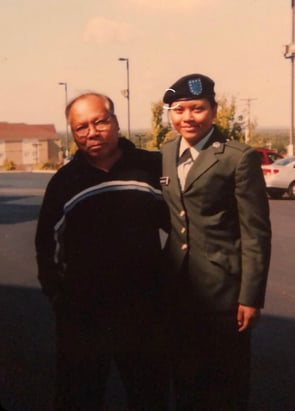
KB: I joined the military in a turbulent time a few years after 9/11. I was in the Texas Army National Guard (Ammunition Specialist) from 2005-2011 and in the Army Reserves (Water Treatment Specialist) from 2011-2013. Both my units were in Fort Worth, Texas. I was briefly part of the Oklahoma National Guard in Oklahoma City during my undergraduate. I was deployed to Camp Taji, Iraq (close to Baghdad) in the middle of massage school. My time in Iraq (2008-2009), I was an armored gun truck driver.
My company provided security for others to transport supplies, mail, people, construction from Camp Taji to various place in Iraq. I was trained in all positions of the gun truck: Truck Commander, Driver and Gunner; in case if one of my team member was incapacitated, I would take over their role effortlessly. I spent months training in tactical driving and maneuvers in convoys, basic maintenance on vehicles, learned how to use military GPS systems, radios, jamming devices, and a little bit of Arabic. Some weeks, I would go to the range every day to do target practice with machine guns. I also learn some combat field medic medicine for emergencies.
The military appealed to me because at the time, I was 17 years old and still in high school. I was thinking how I was going to pay for college. I am a first-generation American and my parent came to the United States with next to nothing. I was too young to sign up on my own. My dad had to sign a permission slip for me to join. The military has great education benefits, and with the National Guard and Reserves, you only have to serve one weekend a month and two week in the summer. Occasionally, there will be a state and national emergency where I would get deployed to help citizens evacuate from an area with natural disaster and/or deployed to war.
2. How does your military experience translate into being a student?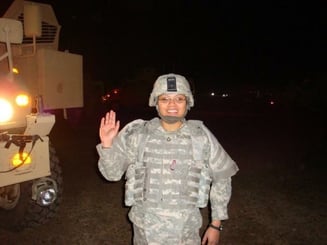
KB: My military experience has instilled the importance of adaptability and perseverance which as helped me as a student. I have a patient in the student clinic that does not want any needles. I was able to adapt and apply other TCM methods, such as, acupressure, cupping, bodywork, meditation, herbs, and medical Qi Gong to the patient. The patient still got great results. We absolutely need perseverance to finish the programs here at AOMA.
3.What are your hobbies?
KB: My hobbies include gardening, Kung fu movies, and of course spending time with friends and family.
4. As a Veteran, can you describe the positive impact practicing integrative medicine, acupuncture, etc has had on you?
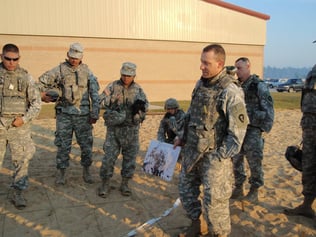
KB: The positive impact that practicing integrative medicine as a Veteran is immeasurable. Veteran are an underserve population. When I was in the military, it seem like pills were given for every condition. It is refreshing to see that Veterans are asking for more integrative approaches. I have talked to several veterans that have gotten acupuncture at the VA and they love it and want more of it!
5. What are your plans for after graduation?
KB: I would like to collaborate with other healthcare professionals while working for myself. I will most likely start a practice in the Dallas-Fort Worth area.
6. How do you feel both your military experience and your education have prepared you for your future?
KB: My military experience combined with my education at AOMA has given me confidence about my future. There is always more to learn and what I have taken away from both experience will give me a good start.
Meet Nadja Profit!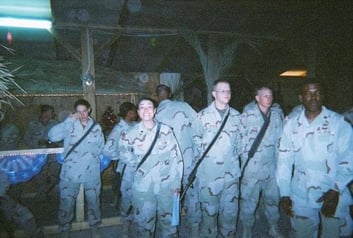
Army, 2003-2011
1. What motivated you to join the military?
NP: I’d always wanted to do something “for the greater good” like the peace core, or teach America… and when I found myself in central Texas, the opportunity presented itself.
2.What are your hobbies?
NP: Information gathering, deep dives on lots of different subjects… My undergrad is in fine art & I still dabble in creating art.
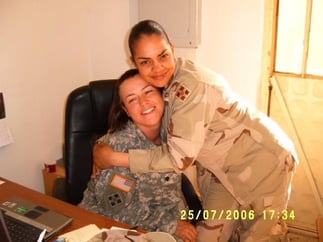
3. As a Veteran, can you describe the positive impact practicing integrative medicine, acupuncture, etc has had on you?
NP: To serve many populations of clients.
4. What are your plans for after graduation?
NP: I plan to start my own mobile clinic and hope to serve many different demographics in part by using a pay it forward type of community acupuncture.
5. How do you feel both your military experience and your education have prepared you for your future?
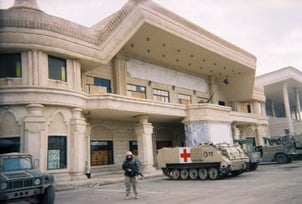
This medicine is like a bridge that connects all of my life experiences and all of the different demographics of people that I’ve been honored to share space with and honed my skills in order.

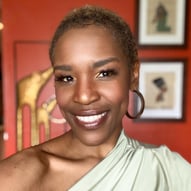 Joyce Carol Oates said, “The great enemy of writing is interruption.” I have lived this truth for the past eight years trying to complete consecutive degrees while raising a large family. It has not been more apparent than in these past four months trying to complete my portfolio, and the past two weeks is a perfect example. I thought my reflection would be the easiest task of all the portfolio items to complete, however constant and frequent interruptions have disrupted my thinking to the point that some days I could not write more than one or two sentences in one sitting. I hope that in sharing my thoughts, I am able to convey the joy, enlightenment, frustrations, limits, and love that was all equally part of my overall experience in this program.
Joyce Carol Oates said, “The great enemy of writing is interruption.” I have lived this truth for the past eight years trying to complete consecutive degrees while raising a large family. It has not been more apparent than in these past four months trying to complete my portfolio, and the past two weeks is a perfect example. I thought my reflection would be the easiest task of all the portfolio items to complete, however constant and frequent interruptions have disrupted my thinking to the point that some days I could not write more than one or two sentences in one sitting. I hope that in sharing my thoughts, I am able to convey the joy, enlightenment, frustrations, limits, and love that was all equally part of my overall experience in this program. 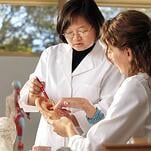
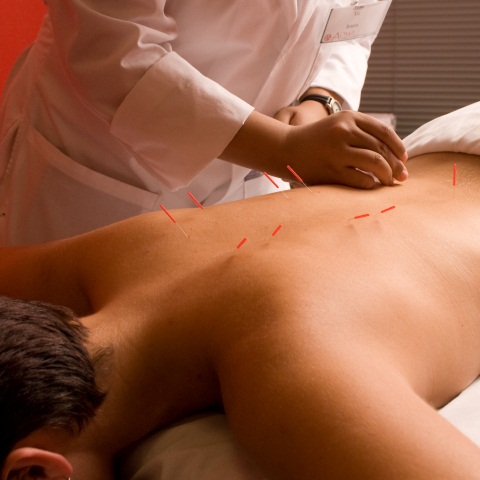 Professional opportunities
Professional opportunities.jpg?width=225&height=150&name=students_studying_(2).jpg)
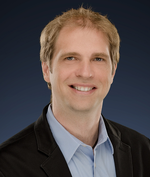 is an accomplished researcher and skilled health care practitioner with a rich academic and professional background. His interest in lifestyle and environmental determinants of health led him to earn a Doctor of Naturopathic Medicine and a Master of Science in Acupuncture & Oriental Medicine from Bastyr University, as well as a Master of Public Health in Epidemiology from the University of Washington. As a practitioner of Naturopathic and Chinese medicines, Dr. Finnell’s clinical focus is on nutrition, pharmacognosy, herb-drug interactions, mind-body medicine, disease prevention, and lifestyle education. In addition to maintaining a professional Naturopathic and Chinese medicine practice, Dr. Finnell has also completed a post-doctoral fellowship with the National Center for Complementary and Alternative Medicine (NCCAM), and served as the acting Director of Research for the TrueNorth Health Foundation. Dr. Finnell’s strong research background and clinical experience as a Naturopathic and Chinese medicine practitioner enable him to bring an evidence-based and integrative perspective to AOMA’s doctoral program.
is an accomplished researcher and skilled health care practitioner with a rich academic and professional background. His interest in lifestyle and environmental determinants of health led him to earn a Doctor of Naturopathic Medicine and a Master of Science in Acupuncture & Oriental Medicine from Bastyr University, as well as a Master of Public Health in Epidemiology from the University of Washington. As a practitioner of Naturopathic and Chinese medicines, Dr. Finnell’s clinical focus is on nutrition, pharmacognosy, herb-drug interactions, mind-body medicine, disease prevention, and lifestyle education. In addition to maintaining a professional Naturopathic and Chinese medicine practice, Dr. Finnell has also completed a post-doctoral fellowship with the National Center for Complementary and Alternative Medicine (NCCAM), and served as the acting Director of Research for the TrueNorth Health Foundation. Dr. Finnell’s strong research background and clinical experience as a Naturopathic and Chinese medicine practitioner enable him to bring an evidence-based and integrative perspective to AOMA’s doctoral program.

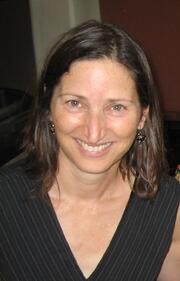 For
For 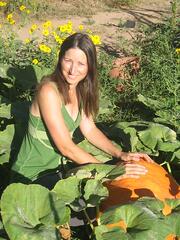 Pamela describes her path to AOMA as “intuitive and visceral.” After she completed her master’s degree program in New Mexico, she enrolled in two year-long continuing education programs. However, something wasn’t right about the decision.
Pamela describes her path to AOMA as “intuitive and visceral.” After she completed her master’s degree program in New Mexico, she enrolled in two year-long continuing education programs. However, something wasn’t right about the decision.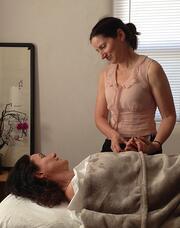 A couple of months later, Pamela started studying pulse diagnosis with Dr. William Morris. When she asked him about AOMA’s new doctoral program, he said, “The first cohort starts on Wednesday. What do you want to know?” and she felt that moment of recognition, an inexorable pull of destiny, that the path of her life would now shift in an unexpected yet welcome way. She expects to graduate from AOMA’s doctoral program in 2015. Her initial research topic – How Chinese Medicine Can Intervene in Multigenerational Trauma – is changing her practice.
A couple of months later, Pamela started studying pulse diagnosis with Dr. William Morris. When she asked him about AOMA’s new doctoral program, he said, “The first cohort starts on Wednesday. What do you want to know?” and she felt that moment of recognition, an inexorable pull of destiny, that the path of her life would now shift in an unexpected yet welcome way. She expects to graduate from AOMA’s doctoral program in 2015. Her initial research topic – How Chinese Medicine Can Intervene in Multigenerational Trauma – is changing her practice.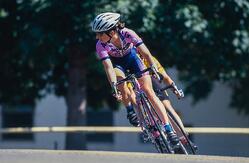 Outside of AOMA, Pamela has a new practice at her own clinic,
Outside of AOMA, Pamela has a new practice at her own clinic, 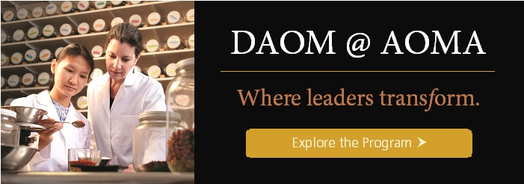
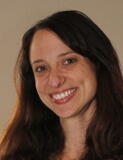 “My choice to pursue my doctorate at AOMA is an easy one because my experience at AOMA (in the master’s program) went beyond all my expectations. The professors and clinic supervisors were outstanding professionals, approachable and eager to support my learning. When the program was over, I felt very well prepared to begin my practice. I have nothing but enthusiasm about returning.” – Debbie Vaughn
“My choice to pursue my doctorate at AOMA is an easy one because my experience at AOMA (in the master’s program) went beyond all my expectations. The professors and clinic supervisors were outstanding professionals, approachable and eager to support my learning. When the program was over, I felt very well prepared to begin my practice. I have nothing but enthusiasm about returning.” – Debbie Vaughn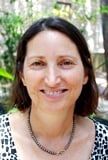 “The AOMA doctoral program on pain care and the psychosocial world offers an exploration of what it means to be human, and that interests me. Pain as a locus of inquiry and a portal into human consciousness is simply brilliant. Pain is a pivot point for people, one that is difficult to ignore and a primary reason for visiting a Chinese medical practitioner.” – Pamela Gregg Flax
“The AOMA doctoral program on pain care and the psychosocial world offers an exploration of what it means to be human, and that interests me. Pain as a locus of inquiry and a portal into human consciousness is simply brilliant. Pain is a pivot point for people, one that is difficult to ignore and a primary reason for visiting a Chinese medical practitioner.” – Pamela Gregg Flax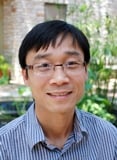 “When my patients entrust their health to my knowledge, I believe that it is my responsibility to continue learning and become the best that I can. Initially, I chose AOMA because I had heard of Dr. William Morris, his profound knowledge in TCM and pulse-taking techniques, and his dedication to the TCM field. After finishing two terms at AOMA, I realized that all of the faculty here are also the best in their specialties. This is rare to find. The guest lecturers are also the best in their field and are willing to share their knowledge and success. Not only is TCM taught more in-depth, but biomedicine and research methods are also emphasized. Moreover, AOMA has the affiliation with hospitals and other major universities where I will be able to learn an integrative approach to healthcare and get access to the tools needed for my research.” - Thang Quoc Bui
“When my patients entrust their health to my knowledge, I believe that it is my responsibility to continue learning and become the best that I can. Initially, I chose AOMA because I had heard of Dr. William Morris, his profound knowledge in TCM and pulse-taking techniques, and his dedication to the TCM field. After finishing two terms at AOMA, I realized that all of the faculty here are also the best in their specialties. This is rare to find. The guest lecturers are also the best in their field and are willing to share their knowledge and success. Not only is TCM taught more in-depth, but biomedicine and research methods are also emphasized. Moreover, AOMA has the affiliation with hospitals and other major universities where I will be able to learn an integrative approach to healthcare and get access to the tools needed for my research.” - Thang Quoc Bui 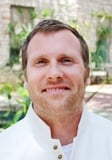 “It is now time to move forward and forge new dreams, to build on what I know and journey into what I do not. We need innovative thinkers and healthcare providers to create explainable models describing the mechanisms behind the tools that we use.” - James Phillips
“It is now time to move forward and forge new dreams, to build on what I know and journey into what I do not. We need innovative thinkers and healthcare providers to create explainable models describing the mechanisms behind the tools that we use.” - James Phillips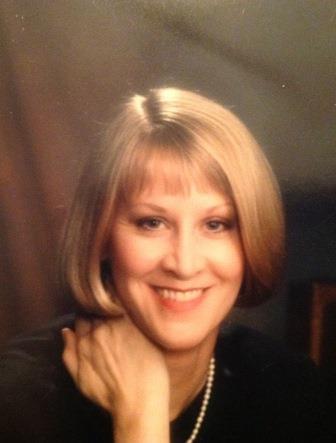 “After 10 years of private practice, I am ready to prepare myself for teaching. The philosophy and structure of the doctoral program at AOMA will further my skills and knowledge to prepare me for teaching in a master’s level program in Oriental medicine, so that new students understand the foundations of Oriental medicine. I think a doctoral level education is necessary to offer this level of teaching.” – Donna Guthery
“After 10 years of private practice, I am ready to prepare myself for teaching. The philosophy and structure of the doctoral program at AOMA will further my skills and knowledge to prepare me for teaching in a master’s level program in Oriental medicine, so that new students understand the foundations of Oriental medicine. I think a doctoral level education is necessary to offer this level of teaching.” – Donna Guthery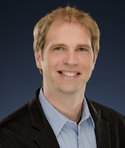 John Finnell, ND, MPH, LAc
John Finnell, ND, MPH, LAc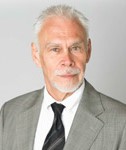 Daniel Weber, PhD, MSc
Daniel Weber, PhD, MSc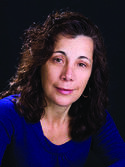 Rosa Schnyer, DAOM, LAc
Rosa Schnyer, DAOM, LAc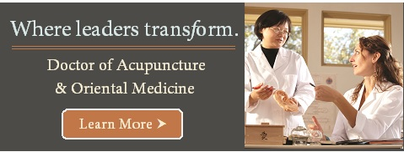
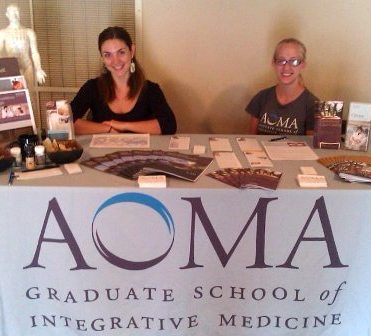 Each year, AOMA Graduate School of Integrative Medicine sponsors the Southwest Symposium (SWS) - a premier, 3-day continuing education and integrative medicine conference. The event brings together practitioners, educators, and other health care professionals from the fields of acupuncture & Chinese medicine, massage therapy, and naturopathic medicine.
Each year, AOMA Graduate School of Integrative Medicine sponsors the Southwest Symposium (SWS) - a premier, 3-day continuing education and integrative medicine conference. The event brings together practitioners, educators, and other health care professionals from the fields of acupuncture & Chinese medicine, massage therapy, and naturopathic medicine.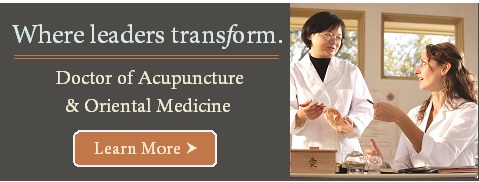
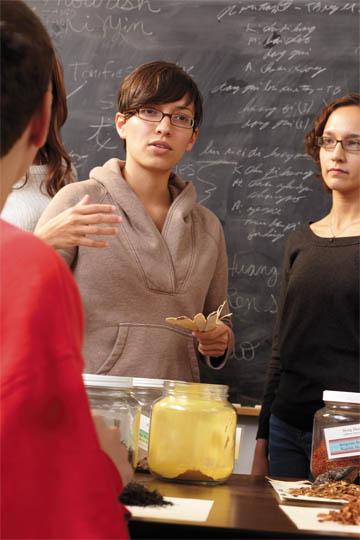.jpg?width=174&height=261&name=classroom_herbs_students-w_(1).jpg)
.jpg?width=174&height=261&name=clinic_lac_(3).jpg)
.jpg?width=174&height=261&name=clinic_supervisor_(6).jpg)
.jpg?width=174&height=261&name=faculty_student_interaction-w_(2).jpg)
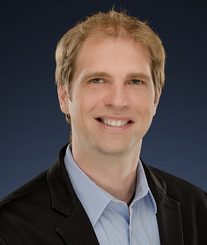 other’s story. Director of Community Relations, Sarah Bentley, interviews
other’s story. Director of Community Relations, Sarah Bentley, interviews 